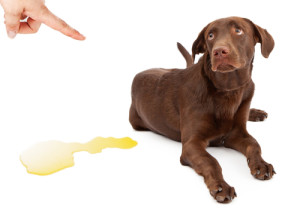I hear it all the time as a dog trainer. “My dog pooped on the (fill in the blank) because he was made I (left him at home, brought home a cat, etc).”
Why Do We Think That?
It’s human nature to want to anthropomorphize our pets.
When we get home and see whatever is it that she has done, the first thing we notice is that she has “that look” on her face. You know the one – head down, body small, ears flat against head, whites of the eyes may be showing. To the average dog owner, they look just like a guilty child.
Then the dog runs away as we approach and we are even more certain that the dog knows she’s been bad.

What the Dog Thinks
Let’s replay the above scenario from the dog’s perspective. They went to the bathroom in the house somewhere (we will deal with the why later). You come home and see it. YOUR body language changes. You stiffen, you raise your voice, you stare at your dog, you shake your finger at them, bend over them, etc.
They RESPOND to your body language with the above description, which, in dog language, is actually fearful or submissive. You walk toward them and they run. Why? Because they know you are mad. Dogs aren’t dumb. They aren’t going to stay there even if they have no idea why you are mad.
So next time you come home and find an accident try an experiment. DO NOT REACT. Do not yell, do not stiffen, act as if nothing is wrong. See what your dog does. If you are a good actor, your dog will act completely normal, with no hint of “guilt.”
Why Dogs REALLY have accidents
First and foremost, they are dogs. Even the most well-trained house dog can have an accident from time to time and their choice of location is that, a choice.
Robin Bennett, CPDT-KA, is a renowned dog trainer and author of dog behavior books. While there are many reasons why your dog may have had an accident, here are her top picks:
- Changes in the routine
- Changes in dog’s health (i.e. are suddenly sick and have to go)
- Stress (including change in schedule, new furniture, new animals, people moving in or out, etc.)
“Often dogs might poop in places such as on a bed or in a closet, likely this is just a private place that smells nice and comforting to the dog,” explains Michelle Yue, CBCC-KA, CPDT-KA.
According to Carol Millman B.sc., RAHT., “What people don’t realize is that stress makes a dog’s bowels move more often. A dog in a stressful situation (noisy party, change of routine) may feel a sudden need to ‘go’, even when it is not their usual time to poop or if they have already had one recently. In extreme cases, like in separation anxiety situations, this can turn into full blown diarrhea that only happens when the owner leaves!”
Other reasons dogs may have accidents are because:
- You waited too long to take them out and they got desperate
- They went in the house once and have now developed a habit
“Once the dog has found a ‘safe’ place, like behind the couch, under the coffee table etc., he will keep sneaking off there whenever he feels the call of nature,” Millman explains. “The more he does it, the more comfortable he will feel in this place and may even prefer it to outdoors, especially in bad weather.”
The good news is all of these types of accidents are fixable with a bit of training, patience, or a trip to the vet’s to find out what’s wrong medically.
“It’s best to reduce the stress by providing more exercise outlets to the dog and possibly some interactive, food dispensing toy to the dog during stressful times to help reduce the problems,” Bennett says.
About the Author
Based in Tustin, Calif., animal lover Kristina N. Lotz is a Certified Professional Dog Trainer – Knowledge Assessed (CPDT-KA) and works as a full time trainer. She also owns her own custom pet products company, A Fairytail House, where she makes personalized collars, leashes, beds, keepsake pillows and blankets, and anything else your imagine can think up. In her spare time, she trains and competes in herding, agility, obedience, rally, and conformation with her Shetland Sheepdogs. She smartly married a Veterinary Technician, who helps keep the fur kids happy and healthy, and provides a quick resource for articles.
